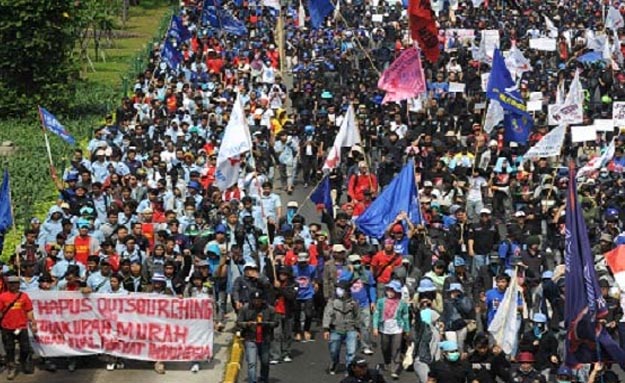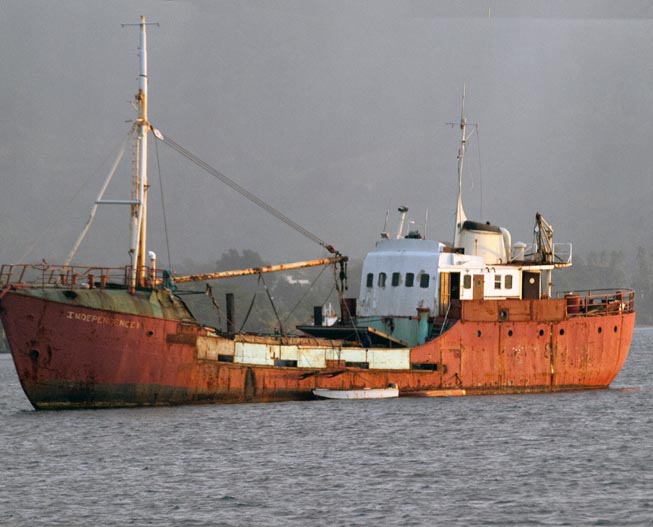
 |
|
The propaganda of the U.S. Information Agency, the development schemes of the
Peace Corps and Agency for International Development, the undermining of local
unions
by the Free Trade Union Institute, the manipulation of the electoral process by the
National Endowment for Democracy, the economic control imposed by the
U.S.-dominated World Bank and IMF, the assassinations and coups by the CIA, the
invasions
by U.S. troops are all weapons in an arsenal designed to promote U.S. interests.
...[T]ogether, the CIA and the `good' agencies have swallowed large chunks of the
world,
one ranting anticommunism, the others bewailing the dismal fate of the "less
developed." This policy partnership is neither so intricately secret as conspiracy, nor
so randomly neutral as coincidence. Rather, it is the natural outcome of a coordinated
and well-functioning state apparatus. Which agencies are deployed, and in what
combination, are coldly pragmatic decisions [made] in response to prevailing
conditions. What is the difference between foreign economic assistance, coup plotting, aid to the internal enemies of a foreign nation, military psychological operations, and propaganda? The answer is there isn't a real distinction. They can be dispatched in different combinations and at different times or under different circumstances and intended to influence different targets. But they're all part of a larger effort to achieve a pre-defined agenda. In other words, they are all propaganda. Foreign assistance is not charity, and its objective is not "development." Nearly all of what is provided to the developing countries, in fact, comes in the form of "technical assistance." This means that schemes to change things are designed in Washington and then contracted, piece by piece, to private American organisations or "NGOs." The U.S. based-contractors in turn go to designated host countries, with American technicians, American goods, American ideas. Progress is monitored at U.S. Embassies around the world and in Washington to make certain that America's needs are served. No wealth changes hands. None!
In fact, many of these projects are intended to implement unwanted (US-made) plans and the foreign and domestic policies of governments in the recipient nations, and thus are attempted precisely because the opinions of host country leaders are "not acceptable" to the U.S. It should come as no surprise, then, that many nations have balked at accepting American "technical assistance." In fact, it has often been necessary to compel them to permit these activities as a condition for World Bank credit or other financiing that does involve the inflow of money to the recipient. This raises an important question: If technical assistance programmes really "assist" people, why do they have to be forced on the people they assist?
The simplest and most straight-forward policy objectives may have to do with pitting one country against another. Say, for instance, you have two countries that share a border. One is governed by leaders submissive to the west, willing to force the people to endure the injuries of a so-called "war on drugs," and generally amenable to US interests. The next door nation, on the other hand, though also poor, is throwing off the old colonial mantle, rejecting foreign meddling, and emerging as a populist, progressive nation that will assert the rights of its people at home and abroad. Naturally, the Washington establishment is going to favor the former over the latter. So lets say it has a trade agreement with that country's right wing leadership to ensure that profits are made from the export of certain commodities. This is the "good doggie" approach; it's a pat on the head and a treat bestowed as a token of appreciation. And American corporations profit nicely in the process. The other country may be pressured to abandon a development project of its own that is highly popular in the nation and would, among other things, give it a competitive advantage over that "friendly" anti-communist country next door. Perhaps this involves building a dam or a modern shipping port. Not so fast! America is going to put pressure on them to abandon the facility. Western leaders will come up with a reason it should be stopped, usually an environmental excuse or arguments that it would thwart the all-powerful military interests of the USA. Maybe they'll suggest that at a latter date they might lease the land for a new naval base - this at a temptingly huge profit to the government (not that it ever materializes). Washington will use its influence at the World Bank to halt lending until the offending project taken off the table. Diplomats will issue intimidating warnings (such as we'll force the devaluation of your currency if you refuse to listen to reason). In the end, Washington must see to it that the government of this "unfriendly" nation is undermined, destabilized, and deprived more and more of its popular support. It has to be softened up for regime change, should that become necessary. The Americans have networks of local sympathizers in virtually every corner of the world. And Washington has identified them and secretly cultivated them. These can be ordinary right wingers or subversive groups on the payroll of the intelligence service. They may be sympathetic jouralists and publishers and broadcasters, even respectable political societies or religious leaders. These can be called on to put additional pressure on the government whenever the US feels it necessary. The more conventional propaganda approach is directed at the masses or sertain segments of society (selective targets). They must be persuaded, or at least a sizable number of them, that the government's overall objectives are less desirable than originally believed. Here's where the radio stations and the pro-US "opinion leaders" come in. Bribes may be paid to influential academics to undermine the popular support for one program or another. An economist from a leading university might be recruited to write a series of articles explaining how a planned sea port might never be completed because the costs have been under-estimated. A geologist might be enticed to proclaim that a dam that would greatly benefit the people is actually located over a dangerous fault line Campaigns can be financed using "in place" dissidents who stage rallies or even incite riots to delegitimize the government. All of this lays the groundwork for the public at large to start questioning the logic of their leaders and the concept of independence from world powers. But beyond that, the people have to be reached in such a way as to think things are changing. Social psychology textbooks teach that, in order to be effective in changing beliefs, a mass media offensive must meet several criteria. Messages must come from credible and respected sources. They would not produce the desired effect, of course, if audiences were to find out that the U.S. is behind the campaign. So local people are recruited to "front" for the U.S. government. Whenever possible, the ideas should reach the audience in a casual way. In other words, viewers and listeners should be exposed to the propaganda during routine activities to minimise the perception that it is a deliberate effort to make them think a certain way. Infiltration of television programs ensures that viewers will be inadvertently exposed to the propaganda, and therefore will be less likely to react defensively. The science of cultural anthropology holds that foreign ideas can more easily be imposed on a target population if people are convinced that others like them have adopted the "new" ways of thinking. In order to accomplish this deception, it is necessary to use a variety of media to present messages that reinforce one another. The simultaneous dissemination ideological themes through a variety of media outlets is deliberately intended to give the false impression that pro-US (or anti-government) sentiment is spontaneous and widespread. When persuasion alone does not work, say psychologists, values can still be changed by enticing even a few members of the group to engage in a desired course of behavior that supports US objectives. This way, they explain, people can be made to "internalise" the concept, and will eventually abandon their own beliefs to resolve the conflict between values and behaviour. This makes them useful parts within a network, even though they probably are not even unaware that network exists. Symbols, too, can be a powerful tool for desensitising the public to a foreign-initiated political or ideological offensive. Constant exposure to images on billboards, clothing, magazines, and the marketplace that undermine the opposing ideal gives a target audience, over time, the impression that the debate is over and that further resistance will be futile. Character assassination is another popular tactic in psychological war. Using collaborators in the media, false accusations of lurid crimes can be leveled against selected government officials or labor leaders. The outrageous allegation is always more potent than the denial. Or as one former CIA official put it, "whoever lies first wins." Finally, examples, even if not overtly presented as such, are a powerful form of leverage. A US campaign of devastating air strikes in Afghanistan or Iraq or Libya is definitely noticed all over the world. Those may achieve no tangible policy goal where the ruined countries are concerned, but those violent interventions certainly do advertise to the rest of the world the extent to which the west will go when seriously provoked.
|



| |
|
Tweet 
|